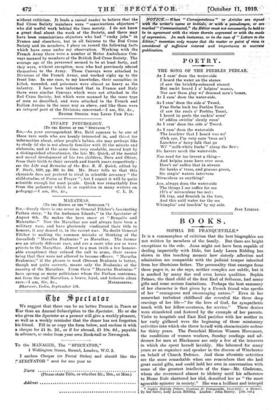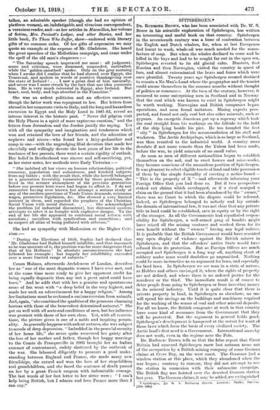BOOKS.
SOPHIA DE FRANQUEVILLE.*
IT is a commonplace of criticism that the best biographies are not written by members of the family. But there are bright exceptions to the rule. Anna might not have been capable of dealing impartially with Dido, but Lady Laura Ridding has shown in this touching memoir how sisterly ,affection and admiration are compatible with the judicial temper inherited from her illustrious father. The personality that emerges from these pages is, as she says, neither complex nor subtle, but it ie marked by many fine and even heroic qualities. Sophia Palmer, the third child of the first Earl of Selborne, hid many gifts and some serious limitations. • Perhaps the best summary of her character is that given by a French friend who speaks of her " courageous and encouraging nature." Even in her somewhat turbulent childhood she revealed the three deep cravings of her life—" for the love of God, for sympathetic touch with her fellow-creatures; for service." These desires were stimulated and fostered by the example of her parents. Visits to hospitals and East End parishes with her mother in her early girlhood were the beginning of those missionary activities into which she threw herself with characteristic ardour for thirty years. The Parochial Mission Women Movement, the conditions of women workers, Sunday readings and ad- dresses for men at Blackmoor are only a few of the interests in which she spent herself lavishly. She laboured for many years as an organizer and speaker in the diocese of Winchester on behalf of Church Defence. And these altruistic activities are the more remarkable when one remembers that she had great social gifts, and could hold her own in conversation with some of the greatest intellects of the time—Mr. Gladstone, whom she reverenced almost to idolatry until his adherence to Home Rule shattered her idol, described her as " the most agreeable spinster in society." She was a brilliant and intrepid * Sophia Matilda Palmer, Comtesse as Franquerille, 1852-1915: a dlensoir. By her Sister, Lady Laura Bidding. London : John Murray. [1.43s. not,[ talker, an admirable speaker (though she had no opinion of platform women), aninslefatigabk and vivacious correspoudent, a voracious reader, and—as her articles in Macmillan, her volume of fiction, Mrs. Penicott's Lodger, and other Stories, and her little 'book, To Those Who Suffer, show—endowed with literary gifta of no common order. Of her gifts of expression we may quote an example at the expense of Mr. Gladstone. She heard the great speeches of the Midlothian campaign, and came under the spell of the old man's eloquence :— " The Saturday speech impres3ed me most : all judgment, sense and criticism, were disarmed, suspended, enthralled, while the golden-mouthed ' spoke. Only on the grey morning when I awoke did I realize that he had slurred over Egypt, the Transvaal, and spoken in words of positive thanksgiving over the state of Ireland ! . . . I saw a great deal of him naturally, and never was I more struck by the fact that ono idea possesses him. He is very much interested in Egypt, also Ireland. But heart., soul, body, and legs absorbed in the Franchise."
She was an ardent politician and an effective canvasser, though the latter work was repugnant to her. Her letters from abroad in her numerous visits to Italy, and the long and hazardous excursion to Egypt and the Holy Land in 1881-82, reveal an intense interest in the historic past. " Never did pilgrim visit the Holy Places in a spirit of more rapturous emotion," and the letters from Jerusalem and the Jordan justify the saying. Yet with all the sympathy and imagination and tenderness which won and retained the love of her friends, and the adoration of nephews and nieces—who found her a fairy-godmother and romp in one—with the ungrudging filial devotion that made her cheerfully and willingly devote the best years of her life to the tendance of her parents, there went a certain rigidity of outlook. Her belief in Brotherhood was sincere and self-sacrificing, yet, as her sister notes, her methods were Early Victorian :- " She imbibed all her views on human relationships, political economy, population and subsistence, and kindred subjects from my father ; with the result that, while she herself belonged to a generation feverishly tormented by those problems, she lived in the serener atmosphere of the previous generation before our present heat-wave had begun to affect it. I do not remember having ever known her attempt a serious study of any of the modern questions of Trade Union demands, minimum wages, protective legislation, &c. She showed a very limited interest in them, and regarded the prophets of the Christian Social Union with social distrust. . . . She acknowledged the problem [of industrial discontent], but distrusted modern attempts to solve it as fraught with explosive danger. To the end of her life she- appeared to confound social reform with socialism ; socialism with syndicalism and anarchism ; and to suspect all alike of being polluted with atheism."
She had no sympathy with Modernism or the Higher Crti- cism :—
" During the Elections of 1886, Sophia had declared that ' Mr. Gladstone had Bulled himself infallible, and that inasmuch as he was unaware of it, the position was far more dangerous than that of his Holiness.' In absolute unconsciousness she had followed his example ; but happily her infallibility extended over a more limited range of subjects."
Canon Holmes, afterwards Archdeacon of London, describes her as " one of the most dogmatic women I have ever met, and at the same time more ready to give her opponent credit for being equally dogmatic than any but a great mind could have been." And he adds that with her a genuine and spontaneous sense of fun went with "a deep belief in the very highest, and made her such an advertisement for a happy religion." Among her limitations must be reckoned a curious aversion from animals. And, again, " she combined the qualities of the generous charming hostess with those of the benevolent determined autocrat." She got on well with all sorts and conditions of men, but her influence was greatest with those of her own class. Yet, with all reserva- tions, the picture given is one of a noble and inspiring person- ality. As generally happens with ardent natures, she was subject to moods of deep depression. "Imbedded in the peaceful security of her home life;" she never quite recovered her gaiety after the loss of her mother and father, though her happy marriage to the Comte do Franqueville in 1903 brought her an Indian summer of contentment, rudely shattered by the outbreak of the war. She laboured diligently to promote a good under- standing between England and France, she made many new friendships, she earned and won the love of her stepchildren and grandchildren, and she faced the sentence of death passed on her by a great French surgeon with indomitable courage. The last words of her last letter to her sister were : " I can't help being British, but I admire and love France more than I can say."



































 Previous page
Previous page